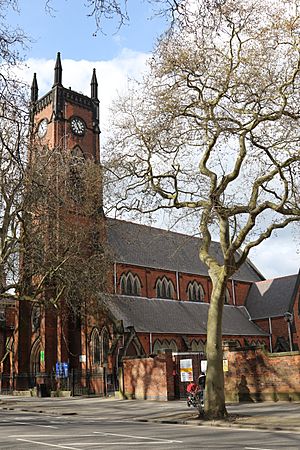Holy Trinity Church, Derby facts for kids
Quick facts for kids Holy Trinity Church, Derby |
|
|---|---|

Holy Trinity Church, Derby
|
|
| 52°55′0.3″N 1°28′10.6″W / 52.916750°N 1.469611°W | |
| Location | Derby |
| Country | England |
| Denomination | Pentecostal |
| Previous denomination | Church of England |
| History | |
| Dedication | Holy Trinity |
| Consecrated | 16 August 1836 |
| Architecture | |
| Groundbreaking | 1836 |
| Completed | 1837 |
| Closed | 1972 |
Holy Trinity Church, Derby is a building on London Road in Derby, England. It used to be a Church of England parish church. Today, it is used by a different church group. The building is considered important locally because of its history.
Contents
History of the Church Building
The First Church (St. George's)
The very first church building on this spot was built in 1831. A person from Sheffield, who was investing in property, built it. It was called St. George's and was a smaller church connected to St Peter's Church, Derby.
However, this first church closed down in 1835. In March 1836, it was bought by new owners and fixed up. It reopened for church services on April 23, 1836.
Becoming Holy Trinity Church
A new church area, called a parish, was created for this church on October 23, 1836. This new parish was formed from parts of the St Peter's parish. The church was then given a new name, Holy Trinity, and officially opened for its new purpose on August 16, 1837.
Problems with the Building
By 1870, the church building started having problems. The tower, which is the tall part of the church, began to lean away from the rest of the building. Workers had to do urgent repairs to tie the tower to the church with iron supports.
Despite these fixes, the church continued to get worse. In 1897, architects looked at the building and said it was in a dangerous condition. Because of this, the top part of the tower had to be removed in 1902. The very last church service in this old building was held on Easter Day in 1903.
Building a New Church
Since the old building was unsafe, a new church needed to be built. On July 15, 1903, a special foundation stone was laid for the new building. This stone was placed by C.E. Newton, a local important person.
The new church was designed by an architect named Charles Hewitt from Brighton. The company that built it was Walker and Slater, from Derby. The new Holy Trinity Church was officially opened and blessed on May 18, 1905. The Bishop of Southwell, Edwin Hoskyns, led the ceremony.
Changing Hands
Holy Trinity Church stopped being a Church of England parish church in 1972. Its parish was then combined with another church, Christ Church, Derby. The Holy Trinity church building was later sold to a different religious group called the Assemblies of the First Born.
The Church Organ
History of the Organ
The church used to have a large musical instrument called an organ. This organ was made by a company called Bates in the 1850s. You can find detailed information about this organ in a special record called the National Pipe Organ Register.
When Holy Trinity Church was no longer used by the Church of England, its organ was moved. It was taken to All Saints’ Church, Aston-upon-Trent, where it is still used today.

